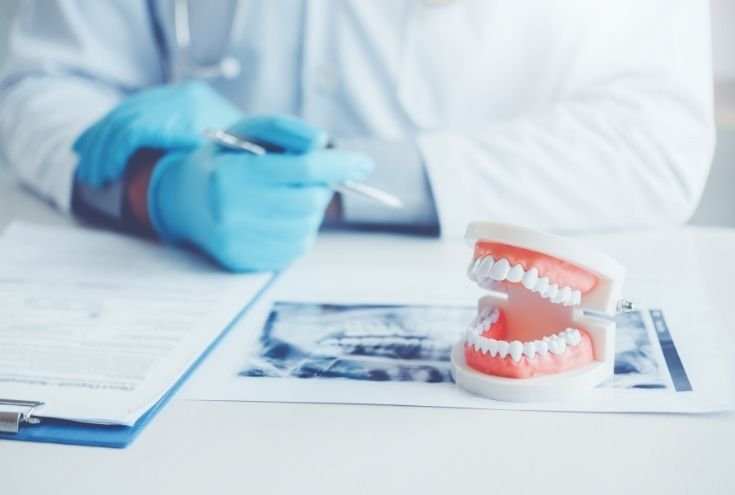

Cosmetic Dentures
What are they?
Cosmetic dentures are removable replacement teeth made of acrylic. If you have gaps of missing teeth this may make it hard to speak or bite and dentures can be a good solution. Full cosmetic dentures replace all upper and lower teeth if they have been lost or extracted. If some of your teeth are still healthy you may opt for partial dentures.
They can improve the overall appearance of your mouth. When teeth are missing, the remaining teeth can shift out of position, which can cause a person’s face to look sunken in. Dentures can help fill out the face and restore a more natural and youthful appearance.
Cosmetic Dentures
What are they?
Cosmetic dentures are removable replacement teeth made of acrylic. If you have gaps of missing teeth this may make it hard to speak or bite and dentures can be a good solution. Full cosmetic dentures replace all upper and lower teeth if they have been lost or extracted. If some of your teeth are still healthy you may opt for partial dentures.
They can improve the overall appearance of your mouth. When teeth are missing, the remaining teeth can shift out of position, which can cause a person's face to look sunken in. Dentures can help fill out the face and restore a more natural and youthful appearance.

What is involved in the making of cosmetic dentures?
Your dentures will be built from an exact model that a dental technician makes of your mouth. Your dentist will fit a wax model on your teeth to record the position of the jaws. Once the trial denture is ready you will try in on and your dentist will make final adjustments. After that the technician permanently fixes the teeth and you will get your custom-made dentures. If there are any problems your dentist can always make small adjustments.
What are the benefits of cosmetic dentures?
Cosmetic dentures are a popular solution for those who are missing one or more teeth. They are removable prosthetic devices that are designed to replace missing teeth and improve the overall appearance of the mouth. They are often made of acrylic or a combination of acrylic and metal, and can be customized to match the shape, size, and color of the patient’s natural teeth.
One of the main benefits of cosmetic dentures is that they can improve the overall appearance of the mouth. When teeth are missing, the remaining teeth can shift out of position, which can cause a person’s face to look sunken in. Dentures can help fill out the face and restore a more natural and youthful appearance.
Another benefit of cosmetic dentures is that they can improve a person’s ability to chew and speak. When teeth are missing, it can be difficult to bite and chew certain foods, which can lead to a lack of nutrition and weight loss. Dentures can help improve a person’s ability to chew and speak, allowing them to enjoy a wider variety of foods and communicate more effectively.
Cosmetic dentures also offer an improvement in the overall quality of life of the patient. People with missing teeth often feel self-conscious about their appearance and may avoid social situations, such as smiling, talking and eating in public. Dentures can help boost a person’s confidence and self-esteem, allowing them to participate more fully in life’s activities.
Cosmetic dentures can also help maintain the natural facial structure. When teeth are missing, the jawbone can shrink and recede over time, which can change the shape of the face. Dentures can help stimulate the jawbone, preventing it from shrinking and maintaining the natural facial structure.
In addition, dentures are a cost-effective solution for replacing missing teeth. Dental implants, bridges, and other options can be expensive, and may not be covered by insurance. Dentures, on the other hand, are often covered by insurance and are a more affordable option for many people.
However, as with any dental procedure, it’s important to consult with a qualified dental professional to determine if cosmetic dentures are the right solution for you. Some people may not be good candidates for dentures, due to issues with their jawbone or overall health. It is important to have a thorough examination and evaluation by a dental professional to determine the best course of treatment.
One of the most important things to consider when choosing cosmetic dentures is finding a qualified and experienced dental professional. It is important to choose a dental professional who has experience in creating cosmetic dentures and who can provide you with a comfortable fit. A good dental professional will take the time to understand your needs and goals, and will work with you to create a customized treatment plan that is tailored to your individual needs.
Once the dentures are fabricated and placed, it is important to maintain good oral hygiene. Dentures should be removed and cleaned daily, using a mild soap and water. It is also important to brush and floss the remaining natural teeth, and to visit the dentist for regular checkups and cleanings.
In conclusion, Cosmetic Dentures are a safe and effective solution for replacing missing teeth. They can improve the overall appearance of the mouth, restore a person’s ability to chew and speak, improve the overall quality of life, and maintain the natural facial structure. With proper care and maintenance, cosmetic dentures can last for many years. Consulting with a qualified and experienced dental professional is the first step in determining if cosmetic dentures are the right solution for you.
Dentures and implants ultimately serve the same purposes. They:
– help you chew foods you might otherwise not be able to eat
– support facial muscles
– improve speech
– increase self-esteem and reduce self-consciousness by giving you a nice smile
Both options also have significant differences between them and our experienced and skilled dentists will be able to advise which treatment is more suitable for your needs and budget.
Implant dentures and traditional dentures are two different types of prosthetic devices used to replace missing teeth.
Traditional dentures, on the other hand, rest on the gums and are held in place by suction or dental adhesive. They are less expensive than implant dentures and can be made and fitted quickly. They can also be easily removed and cleaned.
Advantages of Traditional Dentures:
– They are less expensive than implant dentures
– They are custom made and fitted quickly
– They can be easily removed and cleaned
– They do not require surgery
Disadvantages of Traditional Dentures:
– They are more likely to slip or move around in the mouth over time
– They do not help to preserve the jawbone and facial structure
– They can have less biting and chewing power
– They may need to be replaced or refitted over time
Implant dentures are anchored to the jawbone using small titanium posts, known as dental implants. These posts are surgically placed into the jawbone, and then the dentures are attached to the posts. Because implant dentures are anchored to the jawbone, they are more stable and secure than traditional dentures, which can make them a better option for people who have trouble keeping traditional dentures in place.
Advantages of Implant Dentures:
– They are more stable and secure than traditional dentures
– They do not slip or move around in the mouth
– They help to preserve the jawbone and facial structure
– They allow for more biting and chewing power
– They can last for a longer period of time
Disadvantages of Implant Dentures:
– They require a surgical procedure to place the dental implants
– They are more expensive than traditional dentures
– They may not be an option for people with certain health conditions or for those who have insufficient jawbone density
– The healing period after the surgery may be longer
Ultimately, the decision between implant dentures and traditional dentures depends on an individual’s specific needs, budget, and oral health. It’s important to consult with a qualified dental professional to determine the best course of treatment for you.
Getting cosmetic dentures typically involves the following steps:
1. Initial consultation: During the initial consultation, the dentist will perform a thorough examination of your mouth and discuss your needs and expectations. They will take impressions of your mouth, which will be used to create models of your jaw and teeth. They will also take measurements and make note of any specific needs you may have, such as the need for a partial denture or a full arch replacement.
2. Fitting and try-in: After the models are created, a dentist will use them to create a custom set of dentures for you. You’ll have a fitting appointment, where your dentist will place the dentures in your mouth to check for proper fit, comfort, and speech. If needed, adjustments will be made to the dentures to ensure a proper fit.
3. Final fitting: Once the dentures are adjusted and fit properly, you’ll have a final fitting appointment. At this appointment, your dentist will make any final adjustments and ensure that the dentures are comfortable and secure in your mouth.
4. Follow-up appointments: Dentures may require adjustments over time as your jaw and mouth change shape. Your dentist will schedule follow-up appointments to check the fit of the dentures and make any necessary adjustments.
It’s important to note that the process of getting dentures can take several weeks to complete. The number of appointments and the duration of the process will vary depending on the individual case and the type of dentures you are getting. Additionally, you may be advised to practice speaking and eating with your new dentures before leaving the clinic, this will help you to adapt to your new dentures and make the transition period more comfortable.
To ensure that your cosmetic dentures last for a long time and continue to look and function their best, it is important to follow these aftercare instructions:
1. Clean your dentures daily: Dentures should be removed and cleaned daily, using a mild soap and water. They should be brushed with a denture brush and soaking in a cleaning solution overnight. Only use cold water. Do not use hot water as this will distort your dentures and they may no longer fit properly.
2. Handle with care: Dentures are delicate and can break if dropped. Always handle them with care and avoid bending or twisting them.
3. Keep dentures away from heat: Dentures can warp if exposed to extreme heat. Do not leave them in a car on a hot day or near a stove or fireplace.
4. Visit your dentist regularly: It’s important to visit your dentist for regular check-ups and cleanings to ensure that your dentures continue to fit properly and are functioning well.
5. Be mindful of what you eat: Some foods are harder to chew than others. It is recommended to avoid hard, sticky or chewy foods when you first get your dentures.
6. Using dental adhesive: This can help keep your dentures in place and prevent them from slipping or moving around in the mouth. However, it is important to use the recommended amount and not overuse dental adhesive as it can cause irritation or infection.
7. Store dentures properly: Dentures should be stored in a clean, dry place when not in use. They should be kept in a denture case which will protect them from damage or contamination.
8. Be aware of any changes or discomfort: If you experience any pain or discomfort while wearing your dentures, or if they start to feel loose or ill-fitting, it is important to contact your dentist immediately.
9. Practice good oral hygiene: Even if you have dentures, it is still important to practice good oral hygiene. Brush your gums, tongue, and roof of your mouth every day to remove plaque and bacteria.
10. Be patient: It may take some time to get used to wearing dentures. Be patient with yourself and give yourself time to adjust. With proper care and maintenance, your cosmetic dentures can last for many years and improve your overall quality of life.
How much are cosmetic dentures?
Prices will vary depending on the material of the cosmetic denture as well as the components used if it is in combination with dental implants.
DENTURE (per arch) ……………….. from £2500
Prices may be subject to change. For more information please feel free to contact us on 020 7499 9806 or at smile@holfordcuraden.com
Cosmetic Dentures
Who offers Cosmetic Dentures?
Smile With Confidence Again!
First impressions last, and your smile will tell plenty about you.
Loose fitting dentures that move when you talk or eat can really make you feel insecure.
Let’s fix that for you the best way there is, at Holford Partners Curaden.
Replace your teeth the right way
If you want to replace missing teeth effectively and discretely, your best bet is to go to Holford Partners Curaden for cosmetic dentures. We guarantee effective and long-lasting results, bringing your confidence to the next level.
Frequently Asked Questions
The lifespan of dentures can vary depending on the type of dentures, how well they are cared for, and the person’s oral health. Traditional dentures typically last between 7-10 years, while implant-supported dentures can last for 10-15 years. It’s important to visit your dentist regularly for check-ups and maintenance to ensure that your dentures continue to fit properly and are functioning well.
Yes, you can eat with dentures. It may take some time to adjust to eating with dentures, but with practice, you will be able to eat most of the foods you enjoyed before. It is recommended to avoid hard, sticky or chewy foods when you first get your dentures.
Dentures should be removed and cleaned daily, using a mild soap and water. They should be brushed with a denture brush and soaking in a cleaning solution overnight. It is important to visit your dentist for regular check-ups and cleanings to ensure that your dentures continue to fit properly and are functioning well.
Dentures may cause pain or discomfort when they are first worn, as the mouth and gums may need some time to adjust. Any pain or discomfort should be temporary and can be relieved with over-the-counter pain medication. If the pain or discomfort persists, it is important to visit your dentist to ensure that the dentures fit properly.
Dentures can help fill out the face and restore a more natural and youthful appearance. However, if you’ve had dentures for a long time and your jawbone has shrunk, your face may appear to have changed shape. This can be prevented with implant-supported dentures as they help to preserve the jawbone and facial structure.
It is not recommended to sleep with dentures in as it can cause pressure on the gums and lead to discomfort. It is best to remove the dentures before going to bed and to clean them before putting them back in the morning.
Yes, your dentures can be adjusted if they become loose or uncomfortable. Your dentist can make adjustments or reline the fit or shape of your dentures to ensure that they continue to fit properly.
It depends on the specific dental problems you have. It’s important to consult with a qualified dental professional to determine if cosmetic dentures are the right solution for you. Some people may not be good candidates for dentures, due to issues with their jawbone or overall health.










